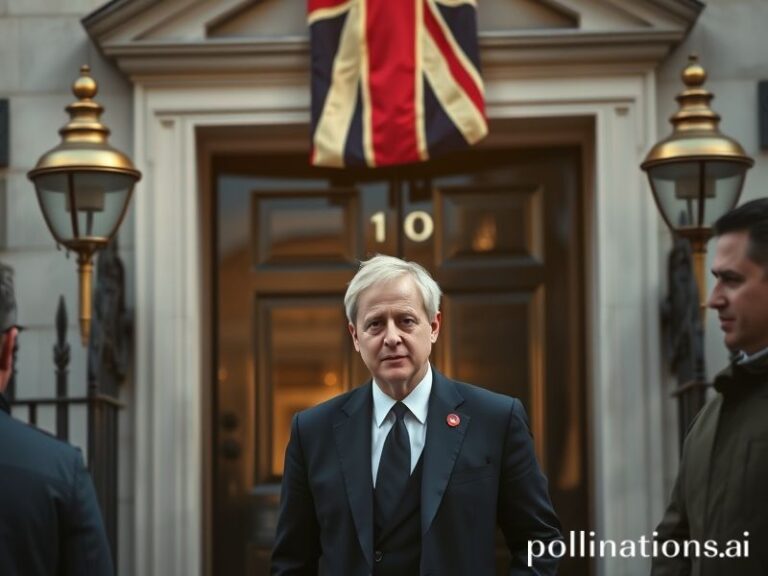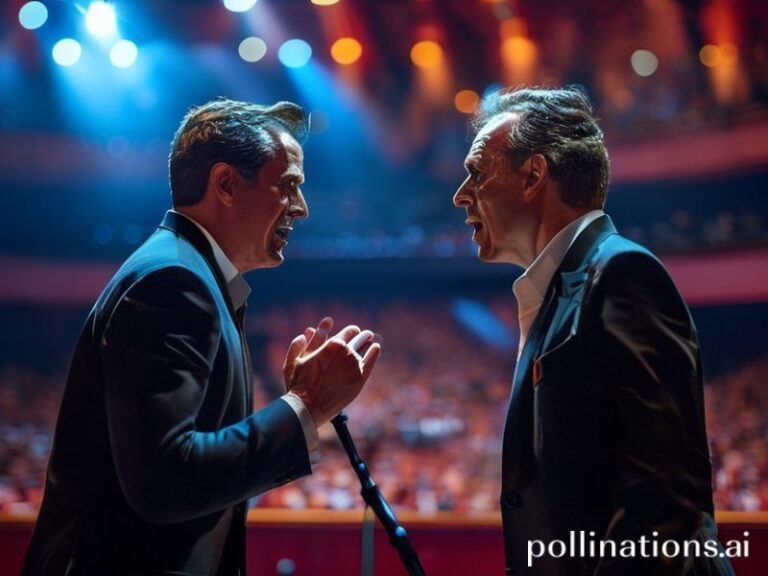kazakhstan vs wales
Kazakhstan versus Wales: a fixture that sounds like the punch-line to an obscure geopolitical joke, yet here we are, pretending it matters. On paper it’s a UEFA Nations League group game; in practice it is a morality play staged for the benefit of arm-chair Brahmins from Bishkek to Bangor, all of whom have Wi-Fi strong enough to sustain existential dread in HD.
The match kicks off in Astana Arena, a 30,000-seat snow-globe dropped onto the steppe like a billionaire’s discarded bauble. Outside, the thermometer reads minus seventeen and falling, which is convenient: the Kazakh FA can market the fixture as “Europe’s coldest derby” and sell branded balaclavas to influencers who will never wear them again. Inside, Welsh fans—1,400 souls who confused loyalty with masochism—huddle like bankrupt penguins, clutching £9 cups of instant noodles that taste of late-stage capitalism. Their team, meanwhile, warms up beneath a giant banner proclaiming “One Nation, One Destiny,” a slogan borrowed from a 1990s energy-drink commercial and now repurposed for whichever dictator last signed the stadium cheque.
Global television executives adore this sort of tie precisely because it has no natural constituency. From Lagos to Lima, insomniacs scroll past it on streaming apps, pause, shrug, and click “Watch anyway,” thereby generating the fractional ad revenue that keeps oligarchs in super-yachts. The game is the footballing equivalent of elevator music: ignorable yet omnipresent, proof that late capitalism can monetise even the void between Borat jokes and sheep gags.
On the pitch, the broader significance begins to emerge. Kazakhstan, ranked 115th, have recently discovered they can naturalise Brazilian wingers faster than most governments approve parking tickets. Wales, ranked 28th, have discovered that Gareth Bale has finally retired to the nineteenth hole and taken the nation’s optimism with him. What follows is 90 minutes of tactical nihilism: the BrazKazhs run in bewildering circles, while the Welsh pass the ball sideways with the enthusiasm of civil servants processing pension claims. Every misplaced pass is cheered by 3,000 locals who have been issued free tickets and instructed to wave plastic flags whenever state television cuts to a close-up. Somewhere in the commentary box, a pundit compares the spectacle to “a chess match played by pigeons,” then apologises—to pigeons.
Yet the real action is in the metadata. Bookmakers in Manila report a surge of micro-bets on the exact minute the first streaker appears; none does, but the algorithmic anticipation alone shifts enough crypto to power a small lunar colony. In Brussels, EU commissioners watch nervously: if Kazakhstan win, they must pretend to congratulate a regime that imprisons poets; if Wales win, they must endure another round of daffodil-flavoured diplomacy. The Americans, bless them, remain oblivious, busy drafting sanctions against whichever country they confuse with Kyrgyzstan this week.
Half-time arrives with the score 0-0, a result so perfectly meaningless it could be taught in philosophy seminars. Both managers give interviews praising “character” and “energy,” words that mean nothing and therefore translate flawlessly into any UN language. Meanwhile, the stadium DJ plays “Sweet Caroline,” because cultural specificity died with the fax machine.
In the 73rd minute, a Kazakh substitute—his surname a Scrabble draw of consonants—laces a shot that deflects off a Welsh defender’s existential crisis and trundles in. The crowd erupts with that particular joy unique to nations who know tomorrow’s headlines are already written. Wales press for an equaliser, but their finishing resembles a committee report: lots of build-up, zero impact.
The whistle blows. Kazakhstan 1, Wales 0. Up in the executive suites, men with medals they never earned clink glasses of fermented horse milk and toast the glorious irrelevance of it all. Somewhere in the metaverse, a non-fungible token of the winning goal sells for the price of a Cardiff studio flat. And somewhere else—perhaps in a bar in Almaty or a living room in Aberystwyth—a child decides football is stupid and becomes a poet, thereby guaranteeing future heartbreak more efficiently than any defence.
That, dear reader, is the true global implication: a game nobody asked for ends exactly as expected, and the world spins on, slightly colder, slightly poorer, but at least mercifully unburdened by surprise.







